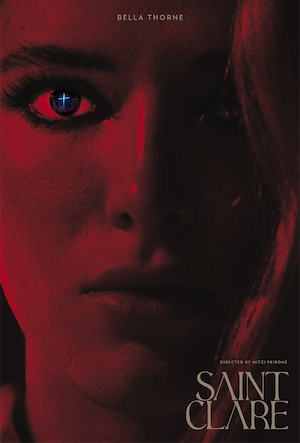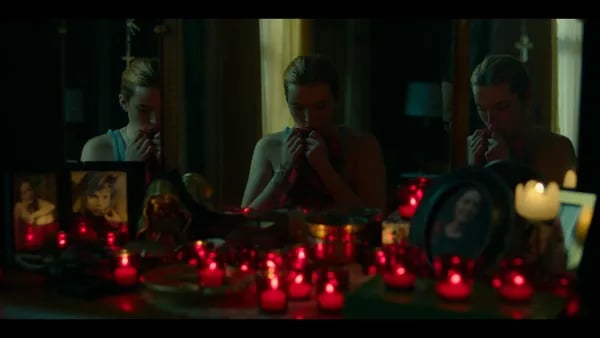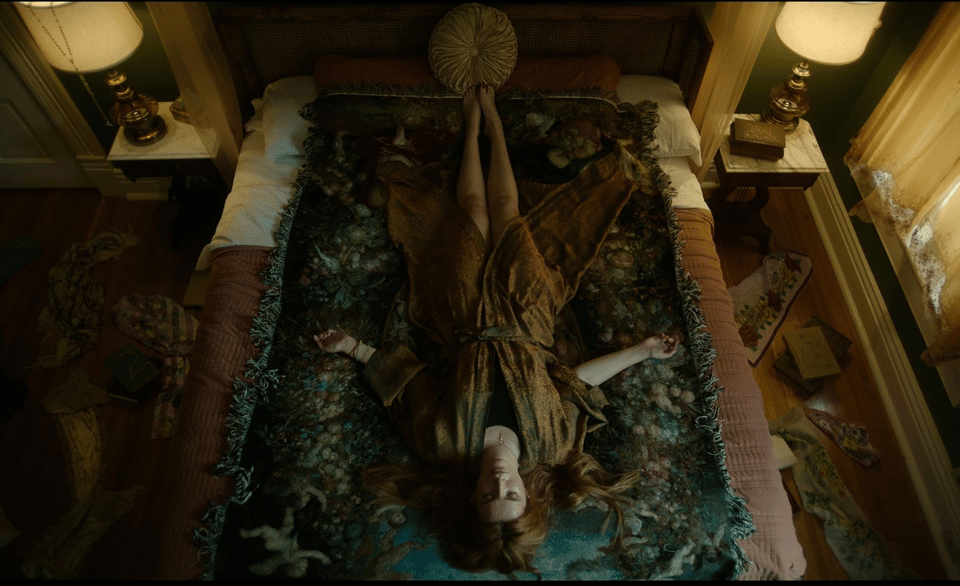Good for her?
Hey, horror hottie.
Last week, I learned that one of my FrightFest 2024 picks, Mitzi Peirone's Saint Clare, will be available to watch digitally in July. It's a darkly funny, taut reimagining of the book Clare at 16 by Don Roff, in which the titular Clare (Bella Thorne) enacts her 'holy destiny' of killing sexual predators.

To celebrate its upcoming release (because I really did love it), I wanted to dedicate this month's essay to the 'good for her' revenge horror sub-genre. Why do we find it so healing? Does revenge always come at a price?
The following missive contains discussions around domestic violence and assault — if you're still happy to read on, then...read on!
Horror as healing
It was at FrightFest 2022 that I met a woman who changed my perspective on horror films. She was an abuse survivor who told me that horror helped her work through her PTSD. It gave her a sense of catharsis and control; she wanted to see victims get their revenge. To see justice executed in all its bloody glory. And it made me wonder — how many of us are doing the same, albeit in our own ways.
"Some people with trauma histories will seek out haunted houses and horror films as an attempt to gain mastery over something that feels out of control. The associated adrenaline rush is a welcomed distraction from the underlying pain and suffering," says Frank Anderson M.D for Psychology Today.
"There can be a sense of belonging watching someone else go through a frightening situation, and there is usually a positive outcome or resolution to the story, which can offer a sense of hope to survivors." Put a pin in that bit about positive outcomes — we'll get to that.
In my humble opinion, revenge horror hits hardest when coming from a minority perspective. People with a legacy of abuse, pain, and trauma baked into their DNA. People for whom pain and fear are a daily part of life simply because of the bodies they were born into. For this reason, I'll only be discussing 'good for her' films made by women (but shout out Midsommar, Hard Candy, and Azrael, which are all faves).
The fantasy of revenge = the fantasy of justice
For many victims in minority groups, justice is a fantasy. In the UK, the national conviction rate for domestic abuse cases is 4.5%, and 60% of rape investigations were closed in June of last year due to the victim dropping out. According to the Femicide Census, 2,000 women have been killed by men since 2009 — that's one woman every three days. And for trans women and BIPOC women, the stats are even bleaker. Women who are lucky enough to get justice still have to carry the burden of public scrutiny and victim blaming. Is it any wonder that they turn to revenge horror for comfort?
Coralie Fargeat's Revenge is a great, if utterly brutal, example of revenge fantasy in action. The film's protagonist, Jen (Matilda Lutz), repeatedly survives the impossible, often through sheer cunning, to come back swinging at her three aggressors. The transgressions against Jen are shown in agonising detail, but the horrors of her revenge are equally as gruesome. It's a difficult, visceral watch that could leave you wondering whether revenge is truly worth the trauma.
In Saint Clare, we get a stark contrast to Fargeat's vision of revenge. Peirone's film embraces aspects rarely seen in horror — softness, beauty, and the divine feminine. Her writing makes liberal use of the black humour in the female experience and indulges our lust for justice in opposition to our quest for goodness.

By casting 'controversial' actress and singer Bella Thorne as Clare, Peirone opens the film up to discussions around society's ideas of the perfect victim and who is deserving of support or justice.
In the years since her big break on Disney at the age of thirteen, Thorne has become a cannabis mogul, adult filmmaker, OnlyFans content creator, singer, author, and someone the tabloids just love to hate. She's an abuse survivor who faced many of the issues outlined in this newsletter.
"And going after him, I talk a lot about that in the book too, of this self-hatred I have because the police, they make their victims feel like villains," Thorne revealed on a 2019 podcast promoting her book. "And so many people don't ever report the abuse."
Predictably, horror has previously cast Thorne in the slutty bitch character trope — most notably in Scream: The TV Series and The Babysitter, treating audiences to the pornographic death scenes usually reserved for unclean or wayward women. Thorne's turn as Clare is a helpful step in a new, more empowering direction.
Revenge is a double-edged sword
While we can sit and cheer our femme avenger on during the height of her killing spree, it's not uncommon for these revenge narratives to bring us crashing back to harsh reality. The reality that sits at the very root of the horror — our physical weakness in comparison to men.
Men can overpower us almost effortlessly; one miscalculation on the part of our antiheroine ends the story in tragedy. Films like [spoilers ahead]...American Mary and Promising Young Woman deliver this sobering gut punch after taking you on a fist-pumping journey riddled with "FUCK yeah!" moments, rendering the defeat even more bitter.

Saint Clare also takes this double-edged sword into consideration via the burden Clare takes on through her justice work. "I feel like she very much aches for a betterment in the world and feels like society has not helped her at all," Peirone told Big Fat Cult. "She represents the 'forgotten' marginalised groups in society who have to take matters into their own hands although they then have to pay the price of making such a choice."
Revenge horror offers us the justice we're often denied in reality, but it also reminds us that healing requires more than fantasy. While we find catharsis in watching our heroines reclaim their power, our fight for justice continues beyond the credits. Look after yourself, babes. x